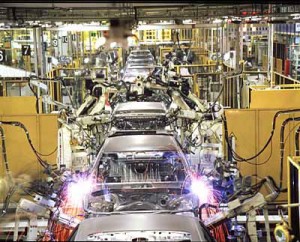
Building a solid relationship with suppliers can be as critical as building the right car. Toyota's supplier relations have been suffering.
After building a solid relationship with its suppliers that may have helped it, in turn, solidify its ties to American consumers, Toyota has slipped from the top spot in an annual study of carmaker supplier relations.
The decline, which could add to the list of recent woes facing the Japanese maker, was revealed in the ninth in a series of annual studies by the Detroit consulting firm, Planning Perspectives Inc. The report shows that not only has Honda taken over the top spot, but that Ford is making fast and solid gains in building bridges with its suppliers.
Why does that matter? “Because suppliers normally give a lot of benefits to their best customers,” explains Planning Perspectives’ President John Henke. A supplier that feels it has a solid and long-lasting relationship to an automaker will not only accept “a premium in pricing,” but also bring that automaker the sort of cutting-edge features and technology that can provide a much-needed advantage in today’s highly-competitive auto market.
Using a complex formula that measures the way supplier and automaker work together, Toyota slipped from a record-high 415 points, in 2007, to just 339 in the 2009 study. Honda has also slipped a bit, from 380, two years ago, to 349, but that still puts it ahead of arch-rival Toyota.
Ironically, Henke says, Toyota’s decline is partly due to its long-running success. In earlier days, before it began building an array of new, U.S. assembly plants, its samurai-like culture ensured there were experienced planners who understood the value of working closely with suppliers. Now, adds Henke, the company is simply growing too fast and is failing to stay focused.
“I don’t think Toyota’s lost their way,” Henke tells TheDetroitBureau.com. “I don’t think they know the way. They’ve got a training problem.”
|
Supplier Profitability Ratings |
||||||
|
|
Chrysler |
GM |
Ford |
Nissan |
Toyota |
Honda |
| Supplier can make acceptable return |
2.4 |
2.5 |
2.9 |
2.9 |
3.2 |
3.4 |
| OEM concerned about supplier profit margins |
1.4 |
1.4 |
1.6 |
1.9 |
2.6 |
2.5 |
| Supplier ability to recover material costs |
1.9 |
1.9 |
2.4 |
2.4 |
2.8 |
2.8 |
| OEM fairness in allocating charge-backs |
2.3 |
2.5 |
2.6 |
2.5 |
3.1 |
3.1 |
That’s showing up in other ways, say analysts such as Ron Harbour, president of Harbour & Associates. The consulting firm’s most recent study of automotive factory productivity saw Chrysler tie Toyota for the first time. Meanwhile, the Japanese maker has suffered setbacks in recent quality studies, such as the latest Vehicle Dependability Study, by J.D. Power and Associates, which ranked General Motors’ Buick division ahead of perennial quality leader Lexus, the luxury arm of Toyota. The carmaker recently reported an $8.2 billion loss.
“It’s going to hurt them,” Planning Perspective’s Henke says of Toyota. It could result in higher prices and the loss of innovation leadership.
While Honda slipped a notch ahead of its rival, Henke warns it shouldn’t celebrate, since the smaller Japanese maker also has lost ground and actually lags in some metrics of supplier/automaker relations.
Those declines could present an opportunity for another Japanese maker, Nissan, which has been pushing hard to improve relations with its parts makers, says Henke.
 And U.S. manufacturers could also benefit. Ford “has come up very fast over the last two years,” the consultant notes, adding that “momentum is in their favor.” Ford had let its relations slip, earlier in the decade, and paid a serious price, including problems with its quality. Now, however, parts makers are “investing more in innovation” that they’re bringing to the U.S. maker, the only one of Detroit’s Big Three not seeking a federal bailout.
And U.S. manufacturers could also benefit. Ford “has come up very fast over the last two years,” the consultant notes, adding that “momentum is in their favor.” Ford had let its relations slip, earlier in the decade, and paid a serious price, including problems with its quality. Now, however, parts makers are “investing more in innovation” that they’re bringing to the U.S. maker, the only one of Detroit’s Big Three not seeking a federal bailout.
Henke says it takes a conscious decision by top management to see the benefit in building a good working relationship with suppliers. Often, it can take years to reap any real reward. That’s why some of Detroit’s makers chose to take a more confrontational approach, in recent decades, trying to slam suppliers for concessions, rather than work together to improve costs and quality.
That was the approach used by General Motors’ former purchasing chief Ignaki Lopez, and, more recently, by John Campi, the one-time Home Depot executive brought to Chrysler by CEO Bob Nardelli, himself a veteran of the building supply chain. Relations between Chrysler and suppliers were “literally destroyed,” contends Henke, and there’s not much Campi’s replacement will be able to do until the company emerges from bankruptcy.
GM is showing some gains, but “it’s a cultural thing,” concludes Henke, that won’t be easy to drive through the troubled company. But despite its ongoing financial problems, GM has taken steps to help its suppliers prepare for the upcoming shutdown in production it has planned in order to bring vehicle inventories more in line with shrinking consumer demand.
